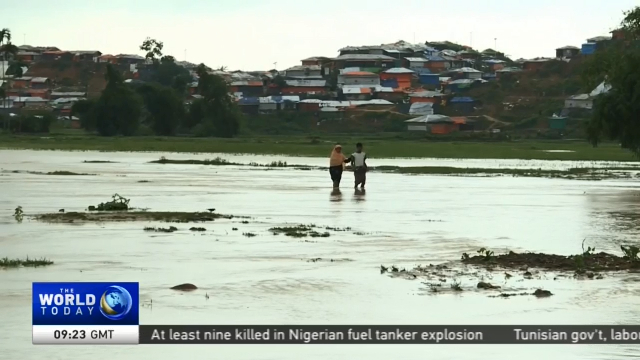
19:47, 29-Jun-2018
Rohingya Refugee Crisis: Monsoon season worsens situation in Bangladesh
Updated
19:30, 02-Jul-2018
02:31

Now to Bangladesh, where the humanitarian crisis at the Rohingya refugee camps is worsening because of monsoon rains. Tens of thousands of Rohingya are still stranded on the Myanmar border, having fled widespread violence in their homeland. If conditions weren't bad enough in the camps, many now look set to lose their make-shift homes in floodings and landslides.
Heavy rains have flooded many areas in the refugee camps in Cox's Bazar. Main roads have become inaccessible for the Rohigya refugees due to flooding. They have to walk for hours to collect food and other necessities or wade through flooded areas to get the aid material home. Ramzaan Begum has been sick for last few days but could not go to the doctor as her camp was cut off from the main road after heavy rains. When her pain became unbearable she asked her son to take her to the hospital.
RAMZAAN BEGUM REFUGEE, BALUKHALI CAMP, COX'S BAZAR "We are facing a lot of difficulty, as there are no paths to walk on. It's too much to bear for us. If we are sick we cannot access the road to get treatment on time. We cannot bring the necessary items for our household, as there is no road."
According to aid agencies more than 200,000 Rohingya refugees are currently faced by the dual-dangers of flooding and landslides. Of these more than half are children who are most vulnerable when it comes to defense against nature's wrath. Most families live in makeshift shelters on hilly areas with no trees, rocks or shrubs to hold sandy ground. About 25000 families are at highest risk and live under fear of being swept away by rains.
JAMAL HUSSAIN BALUKHALI CAMP, COX'S BAZAR "We feel very scared when it rains heavily. Life is very problematic. It's water, water everywhere. Our children cannot step out of the house, nor can our brothers and sisters. We are unhappy and frightened when it rains."
Rain gods have been kind to the refugees as there are sunny days in between heavy showers. It is during these days aid agencies get into action to improve roads and drainage, stabilize slopes and to strengthen the shelters. But given the scale of the refugee population and the challenging environmental conditions, it will be tough to keep all these people out of danger. Ravinder Bawa, Cox's Bazar, Bangladesh.

SITEMAP
Copyright © 2018 CGTN. Beijing ICP prepared NO.16065310-3
Copyright © 2018 CGTN. Beijing ICP prepared NO.16065310-3